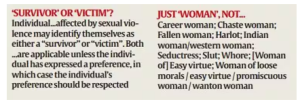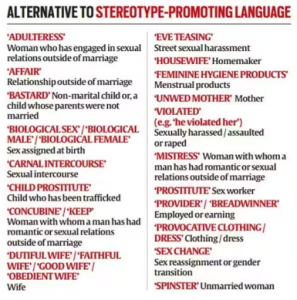Context:
Recently, the Supreme Court of India has launched a 30-page handbook that contains a glossary of gender unjust terms and suggests alternative words and phrases which may be used to reduce inequalities.
Glossary of Words:


Need of such a Handbook:
- To Counter Stereotypes:
- Stereotypes, a set idea that people have about what someone or something is like, especially an idea that is wrong leads to exclusion and discrimination.
- It identifies common presumptions about the way sexual harassment, assault, rape and other violent crimes are viewed, against women.
- To Counter Serious Challenges:
- Courts should take social realities and other challenges facing women seriously.
- It is wrong to assume women are overly emotional, illogical, and cannot take decisions.
- To Increase the Pace of Adopt:
- In a largely patriarchal society, girls are often forced to pick marriage as a way out to avoid social stigma, and not education and a career.
- Even if things are changing, the pace is slow.
Need to Use of Right Words:
- Reflection of the Perception of Society: The language a judge uses reflects not only their interpretation of the law, but their perception of society as well.
- To maintain Constitutional Ethos: The use of stereotypes does not alter the outcome of a case but stereotypical language may reinforce ideas contrary to our constitutional ethos.
- Significance of Language: Language is critical to the life of the law. Words are the vehicle through which the values of the law are communicated.
- Words transmit the ultimate intention of the lawmaker or the judge to the nation.
Conclusion:
To achieve gender equality, fundamental changes need to be made to counter all stereotypes. The handbook may be a guide for judges and lawyers, but it could also be a catalyst for change right down to the societal level.
News Source: The Hindu
![]() 18 Aug 2023
18 Aug 2023


